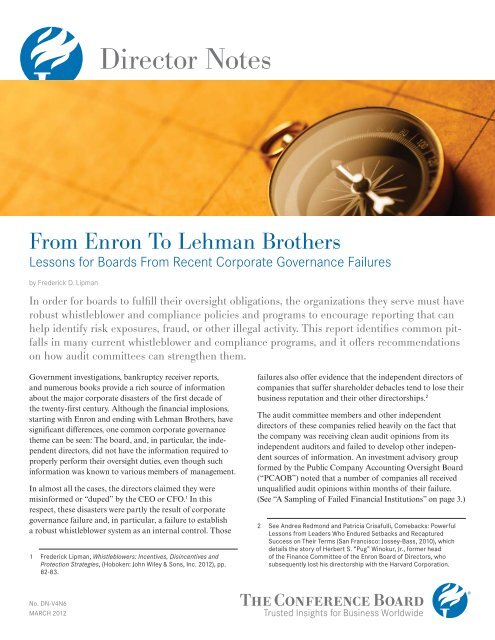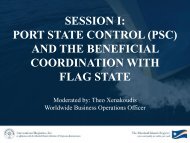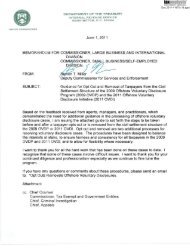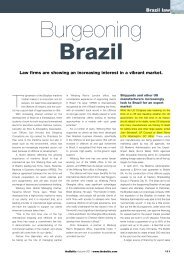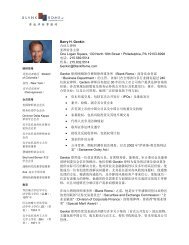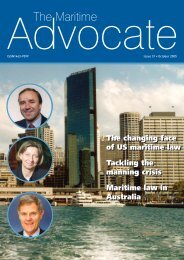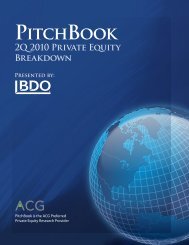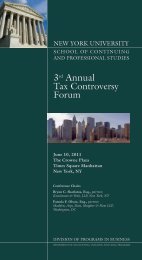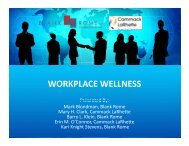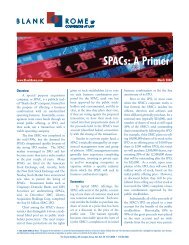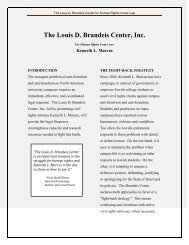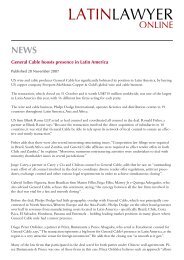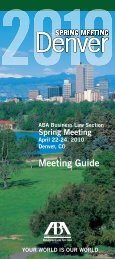From Enron To Lehman Brothers - aacmi
From Enron To Lehman Brothers - aacmi
From Enron To Lehman Brothers - aacmi
Create successful ePaper yourself
Turn your PDF publications into a flip-book with our unique Google optimized e-Paper software.
Director Notes<br />
<strong>From</strong> <strong>Enron</strong> <strong>To</strong> <strong>Lehman</strong> <strong>Brothers</strong><br />
Lessons for Boards <strong>From</strong> Recent Corporate Governance Failures<br />
by Frederick D. Lipman<br />
In order for boards to fulfill their oversight obligations, the organizations they serve must have<br />
robust whistleblower and compliance policies and programs to encourage reporting that can<br />
help identify risk exposures, fraud, or other illegal activity. This report identifies common pitfalls<br />
in many current whistleblower and compliance programs, and it offers recommendations<br />
on how audit committees can strengthen them.<br />
Government investigations, bankruptcy receiver reports,<br />
and numerous books provide a rich source of information<br />
about the major corporate disasters of the first decade of<br />
the twenty-first century. Although the financial implosions,<br />
starting with <strong>Enron</strong> and ending with <strong>Lehman</strong> <strong>Brothers</strong>, have<br />
significant differences, one common corporate governance<br />
theme can be seen: The board, and, in particular, the independent<br />
directors, did not have the information required to<br />
properly perform their oversight duties, even though such<br />
information was known to various members of management.<br />
In almost all the cases, the directors claimed they were<br />
misinformed or “duped” by the CEO or CFO. 1 In this<br />
respect, these disasters were partly the result of corporate<br />
governance failure and, in particular, a failure to establish<br />
a robust whistleblower system as an internal control. Those<br />
1 Frederick Lipman, Whistleblowers: Incentives, Disincentives and<br />
Protection Strategies, (Hoboken: John Wiley & Sons, Inc. 2012), pp.<br />
82-83.<br />
failures also offer evidence that the independent directors of<br />
companies that suffer shareholder debacles tend to lose their<br />
business reputation and their other directorships. 2<br />
The audit committee members and other independent<br />
directors of these companies relied heavily on the fact that<br />
the company was receiving clean audit opinions from its<br />
independent auditors and failed to develop other independent<br />
sources of information. An investment advisory group<br />
formed by the Public Company Accounting Oversight Board<br />
(“PCAOB”) noted that a number of companies all received<br />
unqualified audit opinions within months of their failure.<br />
(See “A Sampling of Failed Financial Institutions” on page 3.)<br />
2 See Andrea Redmond and Patricia Crisafulli, Comebacks: Powerful<br />
Lessons from Leaders Who Endured Setbacks and Recaptured<br />
Success on Their Terms (San Francisco: Jossey-Bass, 2010), which<br />
details the story of Herbert S. “Pug” Winokur, Jr., former head<br />
of the Finance Committee of the <strong>Enron</strong> Board of Directors, who<br />
subsequently lost his directorship with the Harvard Corporation.<br />
No. DN-V4N6<br />
MARCH 2012
It is clear that corporate governance oversight cannot be<br />
effective if the only source of board information is the<br />
CEO, CFO, and the independent auditor.<br />
In reaction to <strong>Enron</strong>, WorldCom, and the other shareholder<br />
disasters that took place from 2000 to 2002,<br />
Congress enacted the Sarbanes- Oxley Act of 2002 (SOX),<br />
which mandated that companies whose stock is traded on<br />
national securities exchanges require their audit committees<br />
to establish procedures for “the confidential, anonymous<br />
submission by employees of the issuer of concerns<br />
regarding questionable accounting or auditing matters.”<br />
This resulted in employee hotlines being established by<br />
most public companies. However, these hotlines have not<br />
been effective in most cases to induce management personnel<br />
to go over the heads of the CEO or CFO and make<br />
disclosures to the audit committee.<br />
For example, prior to the collapse of AIG, there were executives<br />
who recognized the major risks being undertaken<br />
through its derivatives business in credit default swaps, but<br />
they had no incentive to reveal these risks to the directors. 3<br />
According to a Michael Lewis article, in mid-2005, an AIG<br />
executive named Gene Park was fiddling around at work<br />
with his online trading account after reading about this<br />
wonderful new stock called New Century Financial with<br />
a terrific dividend yield. 4 Park looked at New Century’s<br />
financial statements and noticed something “frightening.” 5<br />
The average homeowner counted on to feed the interest<br />
on the “A+” tranche of New Century mortgage-backed<br />
collateralized debt obligations (“CDOs”) had a credit score<br />
of only 598, with a 4.28 percent likelihood of being 60 days<br />
or more late on payment. 6 Park subsequently discovered<br />
that the AIG Financial Products Division was insuring a<br />
substantial portion of the New Century mortgages.<br />
He allegedly revealed this information to Al Frost, Joseph<br />
Cassano’s No. 2 person in the AIG Financial Products<br />
Division, and was ultimately blown off by Cassano, the<br />
former head of A.I.G.’s Financial Products unit. 7 Had a<br />
robust whistleblower system existed at AIG at that time,<br />
Park might have used it to advise the AIG audit committee.<br />
Instead, the AIG Financial Products Division did not reduce<br />
or hedge their existing super-senior tranches of subprime<br />
CDOs, although they stopped writing credit default swaps in<br />
late 2005/2006. 8<br />
Why didn’t Park use the AIG anonymous employee hotline<br />
to report to the AIG audit committee the excess risk being<br />
taken by AIG in issuing credit default swaps? One can only<br />
speculate that there was no reward for Park to do so, and<br />
it is likely he would have had an abbreviated career at AIG<br />
had Cassano discovered that Park had gone over his head<br />
to the AIG audit committee.<br />
According to the <strong>Lehman</strong> Bros. Bankruptcy Examiner<br />
Report, Matthew Lee, a senior vice president of <strong>Lehman</strong><br />
Bros. finance division, was aware of accounting improprieties<br />
at <strong>Lehman</strong> Bros. In May 2008, he sent a letter to<br />
Martin Kelly, his superior and the <strong>Lehman</strong> Bros. controller,<br />
about the Repo 105 transactions used by <strong>Lehman</strong> Bros. to<br />
move assets off the balance sheet at quarter-end. 9 There was<br />
no response to the letter.<br />
Why didn’t Lee use the employee hotline to report the issue<br />
directly to the audit committee? Perhaps Lee decided that<br />
sending a letter to a superior was risky enough without further<br />
jeopardizing his career by going to the audit committee.<br />
There is no evidence that <strong>Lehman</strong> Bros. created any reward<br />
for providing legitimate information on the employee hotline.<br />
In any event, Lee was laid-off less than a month after sending<br />
the letter. 10<br />
According to All the Devils Are Here: The Hidden History<br />
of the Financial Crisis, a book by Bethany McLean and<br />
Joe Nocera, Merrill Lynch senior executive Jeff Kronthal<br />
warned then-CEO Stan O’Neal about the excessive subprime<br />
risk being assumed by Merrill Lynch. His warning<br />
was ignored and disbelieved by the CEO.<br />
3 Bethany McLean and Joe Nocera, All The Devils Are Here: The Hidden<br />
History of the Financial Crisis (New York: Portfolio/Penguin 2010),<br />
p. 190.<br />
4 Michael Lewis, “The Main Who Crashed the World,” in The Great<br />
Hangover: 21 Tales of the New Recession from the Pages of Vanity Fair,<br />
Graydon Carter (ed.) (New York: Harper Perennial 2010), pp. 119-120.<br />
See also “The Financial Crisis Inquiry Report: Final Report of the<br />
National Commission on the Causes of the Financial and Economic<br />
Crisis in the United States,” January 2011, pp. 200-201.<br />
5 Lewis, “The Man Who Crashed the World.”<br />
6 Moe Tkacik’s Page, “That AIG Story, For Readers Who Are Sick of AIG<br />
Already,” July 6, 2009, True/Slant (http://trueslant.com/moetkacik/).<br />
7 Lewis, “The Man Who Crashed the World.”<br />
8 Cohan,“The Fall of AIG: The Untold Story,” Institutional Investor<br />
Apr.7, 2010, p.6 , (www.institutionalinvestor.com/Popups/<br />
PrintArticle.aspx?ArticleID=2460649).<br />
9 Anton R. Valukas, “<strong>Lehman</strong> <strong>Brothers</strong> Holdings Inc. Chapter 11<br />
Proceedings Examiner Report,” March 11, 2010, p. 21 (http://<br />
lehmanreport.jenner.com).<br />
10 Andrew Clark, “<strong>Lehman</strong> whistleblower lost his job weeks after raising<br />
alarm,” March 16, 2010 (www.guardian.co.uk/business/2010/<br />
mar/16/lehman-whistleblower-auditors-matthew-lee).<br />
2 Director Notes <strong>From</strong> <strong>Enron</strong> <strong>To</strong> <strong>Lehman</strong> <strong>Brothers</strong><br />
www.conferenceboard.org
Table 1<br />
A Sampling of Failed Financial Institutions Receiving Unqualified Audit Opinions Within Months of their Failures<br />
Company Event Event Date<br />
Investor losses<br />
($ millions)*<br />
Audit firm<br />
<strong>Lehman</strong> <strong>Brothers</strong> Bankruptcy 9/15/2008 31,437.10 Ernst & Young<br />
American International Group TARP 9/16/2008 155,499.60 PricewaterhouseCoopers<br />
Citigroup TARP 10/26/2008 212,065.20 KPMG<br />
Fannie Mae Government takeover 9/6/2008 64.1 Deloitte<br />
Freddie Mac Government takeover 9/2/2008 41.5 PricewaterhouseCoopers<br />
Washington Mutual Bankruptcy 9/26/2008 30,558.50 Deloitte<br />
New Century Financial Corp. Bankruptcy 4/2/2007 2,576.40 KPMG<br />
The Bear Stearns Companies Inc. Purchased 3/17/2008 20,896.80 Deloitte<br />
Countrywide Financial Corp. Purchased 1/11/2008 22,776.00 KPMG<br />
* Calculated based on decline in market capitalization from one year prior to the event and the event date. Fannie Mae and Freddie Mac data is from 10/9/07 and 9/12/08.<br />
Why didn’t Jeff Kronthal use the anonymous employee<br />
hotline to warn the audit committee of this excessive risk?<br />
Going over the head of the CEO, even on an anonymous<br />
basis, is considered an act of disloyalty to the management<br />
team and typically results in some form of retaliation,<br />
including being considered a pariah within the company<br />
and the industry as a whole.<br />
The final report of the National Commission on the Causes<br />
of the Financial and Economic Crisis in the United States<br />
notes that Matthew Tannin, a Bear Stearns executive, stated<br />
in a diary in his personal e-mail account in 2006, long before<br />
the collapse of Bear Stearns, that “a wave of fear set over<br />
[him]” when he realized that the Enhanced Fund “was going<br />
to subject investors to ‘blow up risk’” and “we could not<br />
run the leverage as high as I had thought we could.” 11 Why<br />
didn’t Matthew Tannin use the anonymous employee hotline<br />
to report his concern to the Bear Stearns audit committee?<br />
He probably did not use it for the same reasons stated above<br />
(i.e., lack of reward and likelihood of retaliation).<br />
These cases are examples of situations where significant<br />
information was known within the management group but<br />
unknown by the audit committee and/or other independent<br />
directors. One may speculate that had this vital information<br />
been reported to the audit committee, the tremendous losses<br />
subsequently incurred by shareholders may have been wholly<br />
or partially avoided.<br />
Defects in Current Whistleblower Systems<br />
Although Congress may have contemplated SOX as an<br />
active and effective whistleblower program, this goal has<br />
not been uniformly realized. Hotlines today are primarily<br />
a vehicle for employment discrimination, sexual harassment,<br />
and other similar employment related complaints, rather than<br />
a pipeline for major fraud, illegality or enterprise risk of interest<br />
to the independent directors. The hotlines typically fail<br />
to create incentives for executives below the CEO and CFO<br />
level to reveal important information directly to the audit<br />
committee. Unfortunately, some independent directors are<br />
misled by the employment-related complaints on the hotline<br />
into believing the hotline is really effective.<br />
There are seven major problems with most current whistleblower<br />
systems:<br />
1 The tone at the top tolerates but does not encourage<br />
whistleblowers, particularly executive whistleblowers.<br />
2 There is no meaningful reward or recognition for legitimate<br />
whistleblowers.<br />
3 The inability to communicate with anonymous whistleblowers<br />
results in a failure to fully investigate anonymous<br />
information.<br />
4 The system does not guarantee anonymity.<br />
5 The system is not well-advertised.<br />
6 The audit committee uses employee administrators and<br />
investigators who are not viewed as independent by<br />
whistleblowers and do not have forensic skills.<br />
11 “The Financial Crisis Inquiry Report: Final Report of the National<br />
Commission on the Causes of the Financial and Economic Crisis in<br />
the United States,” The Financial Crisis Commission, January 2011<br />
(http://fcic.law.stanford.edu/report).<br />
7 Whistleblowers’ motivations and personalities affect the<br />
investigation.<br />
www.conferenceboard.org Director Notes <strong>From</strong> <strong>Enron</strong> <strong>To</strong> <strong>Lehman</strong> <strong>Brothers</strong> 3
Many public companies have a “paper” whistleblower<br />
system. In such a system, the company has complied with<br />
the letter of the SOX requirements and exchange listing<br />
rules but has done nothing more. Management tolerates<br />
the whistleblower system but does not encourage whistleblowers.<br />
Whistleblowers are almost never recognized as<br />
employees of the month. As a result, potential whistleblowers<br />
(including executive whistleblowers) who face daunting<br />
disincentives often refuse to participate in the system.<br />
Concerning the SOX whistleblower statute, the former<br />
general counsel of the Securities and Exchange Commission<br />
(SEC) has stated:<br />
“Not all corporate compliance programs work well.<br />
Some—no matter how elaborately conceived and<br />
extensively documented—exist only on paper. Some<br />
small numbers are shams. I once knew of an ostensibly<br />
anonymous employee hotline that actually rang on the<br />
desk of the CEO’s secretary. I’m not at all sure that<br />
Congress intended that a whistleblower at this company<br />
would have to avail himself of this hotline before coming<br />
to the Commission and getting an award.” 12<br />
Very few, if any, whistleblower systems provide meaningful<br />
rewards or recognition for whistleblowers. Although<br />
some employees are driven by their moral compass to do<br />
the right thing and do not need rewards, the number of<br />
employees who are Mother Teresa is very limited. Given<br />
the real possibility that persons disclosing wrongful activity<br />
may be terminated, or at least potentially socially ostracized,<br />
employees have no reason to assume those risks without a<br />
meaningful incentive. Internal whistleblower systems do not<br />
have to compete economically with the size of awards available<br />
under the whistleblower statutes since there are many<br />
disincentives to external employee whistleblowing. However,<br />
the lack of any meaningful reward or other recognition for<br />
internal whistleblowers reflects an organizational attitude<br />
that is not conducive to whistleblowing.<br />
Although the SOX whistleblower system allows for<br />
anonymous whistleblowers, that system does not work<br />
well because the audit committee or its counsel may need<br />
to further question the person whose identity has been<br />
hidden. Audit committees tend to provide fewer resources<br />
12 David M. Becker, Esq., General Counsel, “Speech by SEC Staff:<br />
Remarks at the Practicing Law Institute’s Ninth Annual Institute<br />
on Securities Regulation in Europe,” U.S. Securities and Exchange<br />
Commission, January 25, 2011.<br />
for investigating anonymous complaints. 13 Unfortunately,<br />
approximately half of whistleblower calls in 2010 were<br />
anonymous, a fact that suggests that many employees fear<br />
retaliation. 14<br />
Moreover, many current whistleblower systems do not<br />
guarantee anonymity. Voice recognition techniques can be<br />
used to trace hotline calls. Private detectives can use handwriting<br />
analysis to trace anonymous letters. Anonymous<br />
e-mails can be traced back to the whistleblower’s computer.<br />
Best practices would provide greater guarantees of anonymity<br />
by permitting communication through the whistleblower’s<br />
personal counsel (at the company’s expense if the<br />
information is legitimate) and allowing the whistleblower to<br />
form an entity to further hide his or her identity.<br />
Hotline service providers advertise their ability to ask further<br />
questions to the anonymous whistleblower. Although<br />
this service is useful, it is not a good substitute for direct<br />
communication between the whistleblower’s lawyer and<br />
the audit committee’s attorney away from the intervention<br />
of the hotline service provider. Hotline providers do not<br />
normally have the forensic skills necessary to ask followup<br />
questions. Sophisticated executive whistleblowers know<br />
that the information they reveal to the hotline, including<br />
their company position, is not protected from discovery by<br />
the attorney-client privilege. Moreover, executive whistleblowers,<br />
concerned about being blackballed and anxious<br />
about maintaining anonymity, will not necessarily be comfortable<br />
with an ongoing detailed dialogue with a hotline<br />
service provider selected by management and possibly even<br />
providing summaries of the conversation to management<br />
personnel. Yet, without this detail it is difficult for the audit<br />
committee to conduct a thorough investigation.<br />
13 James E. Hunton and Jacob M. Rose, “Effects of Anonymous Whistle-<br />
Blowing and Perceived Reputation Threats on Investigations of<br />
Whistle-Blowing Allegations by Audit Committee Members” Journal of<br />
Management Studies, 48, no. 1, 2011, pp. 75-98.<br />
14 “2011 Corporate Governance and Compliance Hotline Benchmarking<br />
Report” The Network, Inc., August 23, 2011 (tnwinc.com/<br />
files/2011TNWbenchmarkingreport.pdf?webSyncID=feeb1011-cfd5-<br />
46f5-9002-b82b755566a9&sessionGUID=839c7949-4019-6a43-<br />
b5c5-2ebd95e8aea9); Deloitte Forensic Center, “Whistleblowing and<br />
the New Race to Report: The Impact of the Dodd-Frank Act and 2010’s<br />
Changes to U .S. Federal Sentencing Guidelines,” 2010 (www.deloitte.<br />
com/view/en_US/us/Services/Financial-Advisory-Services/Forensic-<br />
Center/fb02b4b17deaa210VgnVCM2000001b56f00aRCRD.htm).<br />
4 Director Notes <strong>From</strong> <strong>Enron</strong> <strong>To</strong> <strong>Lehman</strong> <strong>Brothers</strong><br />
www.conferenceboard.org
Many companies do not adequately communicate the<br />
whistleblower system except in a policy contained in<br />
an SEC filing or on their websites. As a result, average<br />
employees may not realize that the company even has an<br />
anonymous whistleblower system. A survey by the Institute<br />
of Internal Auditors indicates that employee familiarity<br />
with the organization’s hotline is a key factor in encouraging<br />
its use. 15<br />
The administration and investigation of whistleblower<br />
complaints are typically performed initially by the internal<br />
auditor, director of compliance, human resources (HR)<br />
head, or general counsel. All of these individuals are company<br />
employees whose compensation is determined by<br />
management (with the possible exception of the internal<br />
auditor).<br />
Potential whistleblowers do not have confidence in the<br />
independence or impartiality of those employees who would<br />
administer or investigate their complaints. Moreover, many<br />
of these individuals are not skilled forensic investigators.<br />
An example of why whistleblower systems do not work can<br />
be found in the <strong>Enron</strong> case. Sherron Watkins sent a letter<br />
to Kenneth Lay, <strong>Enron</strong>’s chairman, stating, in part, that<br />
“I am incredibly nervous that we will implode in a wave of<br />
accounting scandals.” Kenneth Lay then turned the matter<br />
over to inside counsel to administer and investigate Watkins’<br />
complaint, rather than using completely independent counsel<br />
for that purpose. Inside counsel then employed <strong>Enron</strong>’s<br />
regular outside counsel, which received substantial legal<br />
fees from <strong>Enron</strong>, to perform the investigation. At the end<br />
of a very limited investigation, the regular outside law firm<br />
gave <strong>Enron</strong> a report that, in general, found no substance<br />
to Watkins’ complaint. A separate investigation completed<br />
shortly after <strong>Enron</strong>’s bankruptcy by an independent board<br />
committee, using completely independent counsel, found<br />
significant substance to Watkins’ complaint.<br />
Whether a particular company’s hotline is effective can only<br />
be determined through employee surveys and exit interviews<br />
that are directed primarily at the executive group. Independent<br />
directors should consider conducting such surveys anonymously<br />
using third party service providers.<br />
Elements of a Robust Whistleblower Policy<br />
If audit committees and independent directors want to<br />
receive information from executives below the CEO or CFO<br />
level in order to fulfill their oversight obligations, they must<br />
establish a robust whistleblower system and an effective<br />
compliance program.<br />
An effective compliance program requires the following<br />
elements:<br />
• Independent directors must be in charge and must be given<br />
the resources to fulfill their responsibilities.<br />
• The whistleblower system for accounting, auditing, and enterprise<br />
risk complaints must be independently administered.<br />
This means that employees of the company (such as HR,<br />
internal audit or inside counsel) should not initially receive<br />
such hotline complaints, as is the current practice, but rather<br />
complaints should initially go directly to the audit committee<br />
chair or his or her designee (such as completely independent<br />
counsel or other ombudsman). This will assure the whistleblower<br />
that more serious complaints will be independently<br />
handled by persons not beholden to management. Routine<br />
employee complaints, such as employment discrimination,<br />
sexual harassment, and similar complaints, should be referred<br />
back to HR for investigation. Alternatively, a separate hotline<br />
can be developed solely for nonemployment related complaints,<br />
with HR continuing to receive employment-related complaints<br />
on its own hotline.<br />
• Whistleblower complaints (other than for routine employment<br />
discrimination, sexual harassment, and similar complaints)<br />
should be investigated by completely independent counsel<br />
(or other ombudsman) reporting directly to the independent<br />
directors. Employees of the company should not be used to<br />
investigate nonemployment complaints in order to encourage<br />
executive whistleblowers to use the system.<br />
• There should be no presumption that anonymous complaints<br />
are less deserving of investigation.<br />
• Absolute protection of whistleblowers’ identity is essential.<br />
Whistleblowers (i.e., individuals who are reporting issues<br />
other than the routine employment complaints described<br />
above) should be permitted to use their own personal counsel<br />
and to form entities in order to protect their identity. This<br />
protection of identity is designed to encourage executives to<br />
use the whistleblower system.<br />
15 Mary B. Curtis, “Whistleblower Mechanisms: A Study of the<br />
Perceptions of ‘Users’ and ‘Responders,’” Dallas Chapter of the<br />
Institute of Internal Auditors, April 2006.<br />
www.conferenceboard.org Director Notes <strong>From</strong> <strong>Enron</strong> <strong>To</strong> <strong>Lehman</strong> <strong>Brothers</strong> 5
• The motivations and personality of the whistleblower are not<br />
relevant to the truth of the allegations. Whistleblowers with<br />
difficult personalities or who have obviously ulterior motives<br />
may receive short shrift in any investigation, even though<br />
their complaints may be valid. SEC officials made this mistake<br />
in ignoring Harry Markopolos’ revelations about Bernie<br />
Madoff approximately 10 years before his Ponzi scheme was<br />
revealed. 16<br />
• Periodically assess the effectiveness of any employee hotline<br />
and provide employee compliance training.<br />
• Independent counsel should report to the whistleblower or<br />
his or her attorney the status and results of the investigation<br />
and the organization should provide annual reports to all<br />
employees as to actions taken.<br />
• Legitimate employee whistleblowers should receive meaningful<br />
monetary rewards.<br />
• The whistleblower policy must be communicated effectively.<br />
• Milder sanctions should be considered for whistleblowers<br />
involved in illegal group activity.<br />
• Retaliation claims should be independently investigated.<br />
• The director of corporate compliance (if any) should report<br />
to the independent directors and become their eyes and ears<br />
within the organization.<br />
• The tone at the top of the organization must support an<br />
ethical, law-abiding culture. The tone at the top should be<br />
established not only by the CEO and CFO, but also by the<br />
audit committee chair.<br />
A key factor in employee willingness to use hotlines is the<br />
communication of the results of investigations of hotline<br />
tips and the actions taken. 17 Many companies do not adequately<br />
communicate this information to the whistleblower.<br />
16 “Investigation of Failure of the SEC to Uncover Bernard Madoff’s<br />
Ponzi Scheme—Public Version,” U.S. Securities and Exchange<br />
Commission, Office of Investigations, Report No. OIG-509, August<br />
2009, p. 250 (www.sec.gov/news/studies/2009/oig-509.pdf). See<br />
also Harry Markopolos, No One Would Listen (Hoboken, NJ: John Wiley<br />
& Sons, 2010).<br />
17 Ibid.<br />
Conclusion and Action Items<br />
In summary, most current SOX whistleblower systems are<br />
not sufficiently robust to attract potential internal whistleblowers,<br />
particularly executive whistleblowers. Internal<br />
compliance systems do not have to compete monetarily<br />
with available statutory awards since most potential internal<br />
whistleblowers prefer not to suffer the disincentives of going<br />
public with their information, including waiting many years<br />
for any bounties from litigation. However, it is necessary for<br />
the SOX whistleblower systems to provide sufficient incentives<br />
to potential internal whistleblowers to induce them to provide<br />
to the audit committee the information necessary to correct<br />
law violations and to reveal significant risk exposures.<br />
The following are recommended action items for audit<br />
committees:<br />
• Audit committees should reexamine their whistleblower<br />
and compliance policies to make certain that they encourage<br />
reporting of major enterprise risk exposures, fraud, and other<br />
illegal activity.<br />
• Accounting, auditing, or enterprise risk complaints should<br />
be sent by the hotline service directly to the audit committee<br />
chair or his or her designee (such as completely independent<br />
counsel or other ombudsman). Completely independent<br />
counsel refers to a law firm selected by the audit committee<br />
that does not receive any significant legal fees from<br />
management.<br />
• Whistleblower complaints or retaliation complaints from<br />
whistleblowers (excluding routine employment-related<br />
complaints) should be investigated by completely independent<br />
counsel who has forensic capabilities, preferably from<br />
a law enforcement background.<br />
• Employees (particularly executives) should be permitted to<br />
hide their identity by using their personal attorney, forming<br />
an entity, or a combination of both, with the company reimbursing<br />
the costs incurred if the information is legitimate.<br />
• Meaningful rewards should be created for employee whistleblowers<br />
if the information is legitimate. A meaningful reward<br />
might include an amount equal to the yearly compensation of<br />
the employee or a percentage of the savings of the company.<br />
However, the audit committee would retain complete discretion<br />
of the amount of the reward.<br />
6 Director Notes <strong>From</strong> <strong>Enron</strong> <strong>To</strong> <strong>Lehman</strong> <strong>Brothers</strong><br />
www.conferenceboard.org
About the Authors<br />
Frederick D. Lipman is a partner with the international law firm<br />
of Blank Rome LLP and is also the president of the Association of<br />
Audit Committee Members, Inc., a non-profit organization devoted<br />
to developing best practices for audit committees. He has been<br />
quoted in The Wall Street Journal, New York Times, USA <strong>To</strong>day,<br />
Forbes and other business publications and is the author of four<br />
corporate governance books, including Whistleblowers, Incentives,<br />
Disincentives and Protection Strategies (John Wiley & Sons, Inc.<br />
2012), Audit Committees (Bureau of National Affairs 2011),<br />
Executive Compensation Best Practices (John Wiley & Sons, Inc.<br />
2008), and Corporate Governance Best Practices”(John Wiley & Sons,<br />
Inc. 2006).<br />
and professional firms. He is the author of several publications,<br />
including Corporate Governance Handbook: Legal Standards and<br />
Board Practices, the annual U.S. Directors’ Compensation and<br />
Board Practices and Institutional Investment reports, Sustainability<br />
in the Boardroom, and the forthcoming Risk Oversight Handbook.<br />
Recently, he served as the co-chair of The Conference Board<br />
Expert Committee on Shareholder Activism and on the Technical<br />
Advisory Board to The Conference Board Task Force on Executive<br />
Compensation. He is a member of the Network for Sustainable<br />
Financial Markets. Prior to joining The Conference Board, he practiced<br />
corporate law at Davis, Polk & Wardwell. <strong>To</strong>nello is a graduate<br />
of Harvard Law School and the University of Bologna.<br />
About Director Notes<br />
Director Notes is a series of online publications in which The<br />
Conference Board engages experts from several disciplines of<br />
business leadership, including corporate governance, risk oversight,<br />
and sustainability, in an open dialogue about topical issues<br />
of concern to member companies. The opinions expressed in this<br />
report are those of the author(s) only and do not necessarily reflect<br />
the views of The Conference Board. The Conference Board makes<br />
no representation as to the accuracy and completeness of the content.<br />
This report is not intended to provide legal advice with respect<br />
to any particular situation, and no legal or business decision should<br />
be based solely on its content.<br />
About the Executive Editor<br />
Melissa Aguilar is a researcher in the corporate leadership department<br />
at The Conference Board in New York focusing on issues of<br />
corporate governance, regulatory compliance, and risk management.<br />
Prior to joining The Conference Board, she was a contributor<br />
for more than five years at Compliance Week, where she reported<br />
on a variety of corporate governance topics, including proxy voting<br />
developments, executive compensation, risk management, and<br />
shareholder activism. Her work has also appeared in Bloomberg<br />
Brief: Financial Regulation newsletter. She previously held a number<br />
of editorial positions at SourceMedia Inc. Aguilar is a graduate of<br />
Binghamton University.<br />
About the Series Director<br />
Matteo <strong>To</strong>nello is managing director of corporate leadership at<br />
The Conference Board in New York. In his role, <strong>To</strong>nello advises<br />
members of The Conference Board on issues of corporate governance,<br />
regulatory compliance, and risk management. He regularly<br />
participates as a speaker and moderator in educational programs<br />
on governance best practices and conducts analyses and research<br />
in collaboration with leading corporations, institutional investors,<br />
About The Conference Board<br />
The Conference Board is a global, independent business membership<br />
and research association working in the public interest. Our<br />
mission is unique: to provide the world’s leading organizations with<br />
the practical knowledge they need to improve their performance<br />
and better serve society. The Conference Board is a nonadvocacy,<br />
not-for-profit entity, holding 501(c) (3) tax-exempt status in the<br />
United States.<br />
For more information on this report, please contact:<br />
Melissa Aguilar, researcher, corporate leadership at 212 339 0303 or melissa.aguilar@conferenceboard.org<br />
THE CONFERENCE BOARD, INC. www.conferenceboard.org<br />
AMERICAS + 1 212 759 0900 / customer.service@conferenceboard.org<br />
ASIA-PACIFIC + 65 6325 3121 / service.ap@conferenceboard.org<br />
EUROPE/AFRICA/MIDDLE EAST + 32 2 675 54 05 / brussels@conferenceboard.org<br />
SOUTH ASIA + 91 22 23051402 / admin.southasia@conferenceboard.org<br />
THE CONFERENCE BOARD OF CANADA +1 613 526 3280 / www.conferenceboard.ca<br />
© 2012 by The Conference Board, Inc. All rights reserved. Printed in the U.S.A.<br />
The Conference Board® and the torch logo are registered trademarks of The Conference Board, Inc.


